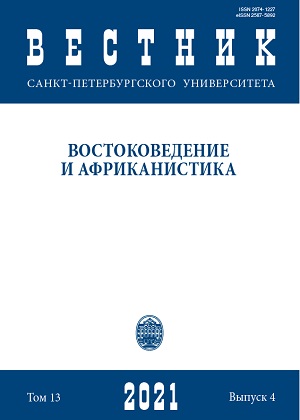Influence of the Multiethnic Environment on the Diasporic Identity of Koreans in Kazakhstan
DOI:
https://doi.org/10.21638/spbu13.2021.404Abstract
The author of this article examines the phenomenon of diaspora and diasporic identity, conditions, and factors influencing the transformation and development of identity in a multiethnic society in Kazakhstan. Diasporic identity is a multifaceted phenomenon characterized by its dynamism. Kazakhstani Koreans (ethnonym — “Koryo Saram”) are integrated into the multiethnic society of modern Kazakhstan and it can be argued that the overwhelming majority of them are urbanized. This factor determines the high rate of acculturation, which leads to the transformation of the traditional Korean community. The author also analyzes the relationship between ethnic and diaspora identities. The characteristic forms of manifestation of ethnic identity, as well as methods for preserving and manifestation of the ethnic identity of the Korean diaspora in Kazakhstan, are analyzed. A diaspora is not a diaspora by default — initially, it is a group that is in an amorphous state, which can develop into a diaspora, provided that its construction is based on ethnic consciousness. The community of Koreans in Kazakhstan is not ethnically closed. As a result, the nature of the phenomenon of diasporic identity was determined and the forms of manifestation of the diasporic identity of Koreans in Kazakhstan were identified. The diasporic identity of Koryo Saram — a construct of various identities, which are based on a common cultural basis and are superimposed on the identity of representatives of the multiethnic society of Kazakhstan — is a “borderline” phenomenon: on the one hand, representatives of the diaspora are focused on the preservation of their ethnic and cultural identity, or “otherness” in relation to the ethnic majority; on the other hand, the situation of long-term residence and adaptation to new socio-cultural conditions determines the process of socialization and the formation of the Republic of Kazakhstan’s civic identity.
Keywords:
ethnic identity, diaspora, multiethnicity, identity markers, Koryo Saram, Koreans of Kazakhstan
Downloads
References
Downloads
Published
How to Cite
Issue
Section
License
Articles of "Vestnik of Saint Petersburg University. Asian and African Studies" are open access distributed under the terms of the License Agreement with Saint Petersburg State University, which permits to the authors unrestricted distribution and self-archiving free of charge.





